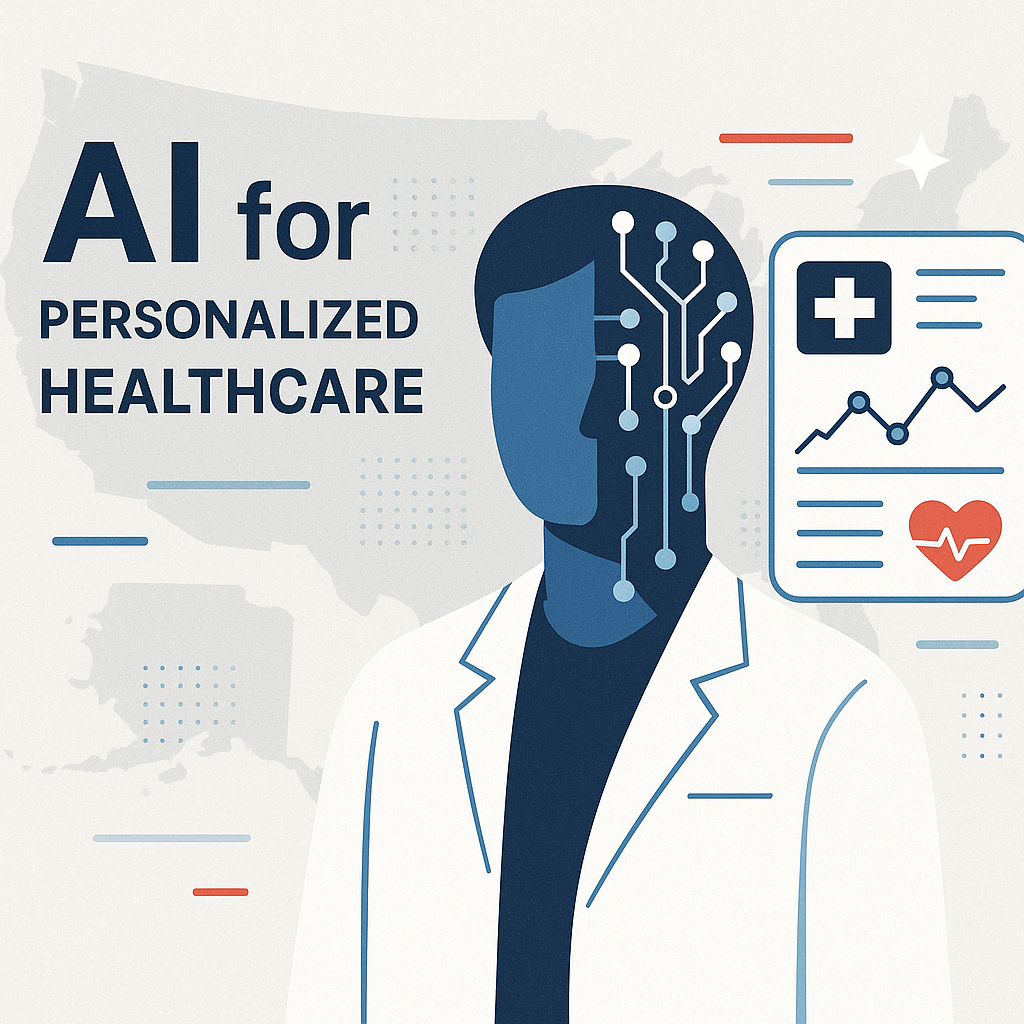
AI for Personalized Healthcare: Transforming Medicine in 2025
Artificial Intelligence (AI) is revolutionizing the healthcare industry, especially in the realm of personalized medicine. As we enter 2025, AI for personalized healthcare is not just a futuristic concept—it’s a present-day reality shaping patient outcomes, streamlining clinical workflows, and enabling truly individualized care. This comprehensive guide explores how AI is driving personalized healthcare in the U.S., the top applications, benefits, challenges, and what the future holds.
Understanding AI for Personalized Healthcare
Personalized healthcare, also known as precision medicine, tailors medical treatment to the individual characteristics of each patient. By leveraging AI, healthcare providers can analyze vast amounts of data—genomics, lifestyle, electronic health records (EHRs), and more—to deliver care that is uniquely suited to each person.
What Is AI for Personalized Healthcare?
AI for personalized healthcare refers to the use of advanced algorithms, machine learning, and data analytics to:
- Predict disease risk and progression
- Recommend customized treatment plans
- Monitor patient health in real time
- Enhance diagnostic accuracy
TIP: 🏥 AI-driven personalized healthcare empowers both patients and providers by making medicine more proactive, predictive, and precise.
Top 10 Applications of AI for Personalized Healthcare in the U.S. (2025)
AI is making waves across multiple facets of healthcare. Here are the top 10 applications of AI for personalized healthcare in the United States this year:
- Genomic Analysis for Tailored Therapies
- Predictive Analytics for Disease Prevention
- Personalized Drug Recommendations
- AI-Powered Diagnostic Imaging
- Remote Patient Monitoring and Wearables
- Virtual Health Assistants and Chatbots
- Personalized Cancer Treatment
- Chronic Disease Management
- Mental Health Support and Prediction
- Optimized Clinical Trial Matching
Side-by-Side Comparison Table
| Rank | Application | Key Benefit | Example Use Case |
|---|---|---|---|
| 1 | Genomic Analysis for Tailored Therapies | Custom treatments based on DNA | Cancer genomics |
| 2 | Predictive Analytics for Disease Prevention | Early intervention and risk reduction | Diabetes risk prediction |
| 3 | Personalized Drug Recommendations | Right drug, right dose, right patient | Pharmacogenomics |
| 4 | AI-Powered Diagnostic Imaging | Faster, more accurate diagnoses | Radiology, pathology |
| 5 | Remote Patient Monitoring and Wearables | Continuous, real-time health tracking | Heart rate, glucose monitoring |
| 6 | Virtual Health Assistants and Chatbots | 24/7 personalized support | Symptom triage, medication reminders |
| 7 | Personalized Cancer Treatment | Targeted therapies, improved outcomes | Immunotherapy selection |
| 8 | Chronic Disease Management | Individualized care plans | Hypertension, COPD management |
| 9 | Mental Health Support and Prediction | Early detection, tailored interventions | Depression, anxiety monitoring |
| 10 | Optimized Clinical Trial Matching | Faster, more relevant trial enrollment | Oncology, rare diseases |
How AI Powers Personalized Healthcare: Key Technologies
Machine Learning and Deep Learning
AI models analyze complex datasets—like genetic profiles and medical histories—to identify patterns and predict outcomes. Deep learning, a subset of machine learning, excels at interpreting medical images and unstructured data.
Natural Language Processing (NLP)
NLP enables AI systems to understand and extract insights from clinical notes, patient records, and even patient conversations, making it easier to personalize care.
Predictive Analytics
By combining patient data with population health trends, predictive analytics can forecast disease risk, hospital readmissions, and treatment responses.
Integration with Wearables and IoT Devices
Smart devices collect real-time health data, which AI algorithms use to monitor patient status and recommend timely interventions.
TIP: 📦 Integrating AI with EHRs and wearable devices creates a holistic view of patient health, enabling truly personalized care.
Benefits of AI for Personalized Healthcare in the U.S.
Improved Patient Outcomes
✅ AI-driven insights lead to earlier diagnoses, more effective treatments, and better disease management.
Enhanced Efficiency for Providers
✅ Automated data analysis and decision support free up clinicians to focus on patient care.
Cost Reduction
✅ Personalized medicine reduces unnecessary treatments and hospitalizations, lowering overall healthcare costs.
Increased Patient Engagement
✅ Personalized recommendations and virtual assistants empower patients to take charge of their health.
Challenges and Considerations for AI in Personalized Healthcare
While the promise is great, several challenges remain:
- Data Privacy and Security: Protecting sensitive health data is paramount.
- Bias and Fairness: AI models must be trained on diverse datasets to avoid biased recommendations.
- Integration with Existing Systems: Seamless interoperability with EHRs and other platforms is essential.
- Regulatory Compliance: Adhering to HIPAA and FDA guidelines is mandatory.
TIP: ✅ Healthcare organizations should prioritize transparency, patient consent, and robust cybersecurity when deploying AI solutions.
The Future of AI for Personalized Healthcare in 2025 and Beyond
As AI technologies mature, expect even greater personalization in healthcare:
- Real-time, adaptive care plans that evolve with patient needs
- Expanded use of digital twins—virtual models of patients for simulation and prediction
- Greater patient autonomy through AI-powered self-management tools
- Wider adoption of AI in rural and underserved communities to bridge care gaps
Conclusion
AI for personalized healthcare is fundamentally transforming the U.S. medical landscape in 2025. By harnessing the power of machine learning, predictive analytics, and real-time data, healthcare providers can deliver care that is more precise, proactive, and patient-centered than ever before. The top applications—from genomic analysis to virtual health assistants—are already improving outcomes, reducing costs, and empowering patients. However, challenges like data privacy, bias, and integration must be addressed to ensure equitable and effective care for all. As AI continues to evolve, the future of personalized healthcare looks brighter, more efficient, and more human-centric—ushering in a new era of medicine tailored to each individual.